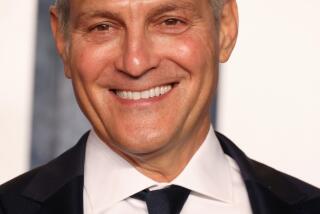Vivendi, Seagram Try to Sell the Deal in Whirlwind Tour
- Share via
It’s not easy selling a $34-billion deal, as France’s Jean-Marie Messier knows from his tiring, whirlwind roadshow this week pitching Vivendi’s proposed acquisition of Seagram and its Universal Studios entertainment operation.
Vivendi’s spirited 43-year-old chairman is weary from a schedule that in four days took him from New York to Boston to Chicago to Denver to Los Angeles, and finally to San Francisco on Thursday before flying back to Paris.
Ordering a Coke, Messier plops down in a dimly lighted corner booth in the Omni Hotel’s restaurant in downtown Los Angeles after most diners have cleared out for the night.
Eyelids droopy, he nonetheless comes alive as he launches into his pitch for what will be known as Vivendi Universal, a $100-billion company. “It will really be the first well-balanced group that’s neither U.S.-centric [nor] Europe-centric,” he says.
Skepticism abounds on both sides of the Atlantic, and Messier is well aware that the level of enthusiasm detected in his smooth, French-accented English is as important as any cash flow numbers he rattles off. A practiced salesman, Messier extols the advantages of combining his water utility-turned-media company with Universal’s music, movie, TV and theme park operations.
These transatlantic pieces fit together in a three-way deal combining Seagram, Vivendi and its European subsidiary, pay TV giant Canal Plus.
Since announcing the deal a week ago, investors have battered Vivendi’s stock, questioning whether the French company’s $77.35-a-share stock offer is too rich a price to pay for Seagram. Seagram’s stock closed at $58, down from a high of $64 after the deal was announced. Vivendi closed off 22% on the Paris exchange over the same period.
“We were not the first to say that it was worth $77. Basically, all the analyst reports ranged from $70 to $78 per share. We do think this is a fair price. . . . We have a lot of room to create additional value,” Messier says. He adds the stock market hammering also is being fueled by short-term stock traders whose influence should be felt only temporarily.
At Messier’s side is Canal Plus chief Pierre Lescure, who turns 55 in July. The two traveled to the hotel with Seagram Chief Executive Edgar Bronfman Jr., who plans to stay with the combined company as a vice chairman overseeing music and Internet activities.
This week, Messier has been peppered with questions from U.S. investors during a jaunt that moves from city to city faster than a rock tour. Last week, it was the same drill in Europe. As Messier notes, what makes selling this deal especially hard is that he must tell different stories on each side of the Atlantic.
Europeans, he says, don’t understand the potential value of Seagram’s stable of musical artists such as Shania Twain and rapper Eminem when they are meshed into Vivendi’s vision of a wireless world connected by devices such as cellular phones or Palm Pilots, pay TV services and its newly launched Vizzavi Internet portal.
Likewise, Americans need to be brought up to speed on the vast wireless technology advances being pioneered in Europe that will soon make accessing songs, sports highlights, entertainment and news flashes something that can be done anywhere, any time on any electronic device.
“When I’m looking to Europe investors’ reaction, I just need to explain to them the music because it dominates this business,” Messier says. “When I’m in front of U.S. investors, I just need to explain Vivendi/Vizzavi because this multi-access world is not yet a U.S. world.”
Lescure, who linked up with Messier in Denver for a five-hour investor meeting, is also exhausted, having traveled from Paris earlier in the day. Speaking thickly accented English compared with Messier’s easy conversation, Lescure nurses a vodka and tonic, reminding that he’s still on Paris time, where it’s 5 a.m.
Both Messier and Lescure go out of their way to endorse Universal Studios chief Ron Meyer, whose status has been questioned repeatedly despite Vivendi assurances that Universal’s management will remain intact. Lescure, who will oversee all of Vivendi Universal’s movie and television activities in Hollywood and abroad, met for the first time Thursday morning with Meyer, movie studio Chairman Stacey Snider and Universal Music Group President Zach Horowitz in a breakfast meeting at the Omni Hotel. Also there was Lescure’s first lieutenant Alex Berger, Messier and his right-hand man, Vivendi Chief Operating Officer Eric Licios, and Bronfman.
Hollywood insiders believe tensions between the two cultures are inevitable and wonder how long a leash Messier and Lescure will actually give Meyer and his team. Lescure let it drop that he plans to spend at least one-third of his time here the first year, he hopes to buy a home in Los Angeles and has already made plans to return shortly after the Fourth of July holiday.
What’s more, Vivendi plans to install an on-site chief financial officer and a movie business executive to keep an eye on Vivendi’s interests.
“When we make an acquisition, whatever it is, naturally we appoint a good CFO at the beginning,” says Licios, who will share the title of co-COO of Vivendi Universal with Lescure. “It’s someone who understands the business and the shareholders. It also leaves a seat for a movie business affairs executive,” he adds.
Lescure says that he will not be reading scripts (“just for pleasure”) and that “it’s too early” to talk about the practicalities of how this is all going to work between Universal and its transatlantic boss.
When asked whether he will be approving the budgets of the American movies as he does the 30 or so French and European movies Canal Plus produces every year, Lescure says, “Yes. But, we have not yet written all the rules.”
Messier insists that USA Networks mogul Barry Diller, who controls Seagram’s TV assets through a complicated deal and has a strained relationship with Bronfman, fits perfectly into Vivendi’s plans.
“USA Networks is a core asset, and Barry Diller is the guy who created the value of USA Networks. If there is one thing that I do respect in this world, it’s the people who are creating value. Don’t you think this can fit with Vizzavi? It’s opening new windows outside the States. And, USA Networks is wonderful leverage to TV distribution in the States,” Messier says.
Much of the Vivendi deal requires a leap of faith in technology still in relative infancy, especially in the U.S. Ever the salesman, Messier likes to demonstrate his wares, pulling a Motorola cell phone out of his pocket in a “let me show you something” moment.
With the cell phone, he calls up a message announcing the launch Wednesday of the most recent live recording of French singer Johnny Halliday, who records for Universal. Messier’s point is that more than 2 million mobile subscribers in France got the same message Wednesday. “That’s already by far the largest direct-marketing operation that Universal Music ever made,” he says.
Pulling out a Palm Pilot, he notes that under the Vivendi vision, one could watch the winning goals in a soccer match, view movies or scout and book the nearest Italian restaurant or the nearest theater playing “Gladiator.” The Yahoo-like gatekeeper for all this is the Vizzavi Internet portal Messier launched earlier this month with British telecommunications company Vodaphone. It now links 80 million people through mobile phones or digital TV and is expected to have 100 million linked by the end of next year. And each of the 300 million compact discs Universal sells annually in Europe will have software to load Vizzavi for free.
Despite the reliance on gadgetry, Messier says the strategy is actually simple: to create the world’s leading communication group of the Internet age, accessible to people via wireless phone, computer or TV set.
Where does Seagram and Universal fit in?
“Within that new Internet age, there are a five contents that are key: music, movies, sports, education and games. Those are the fields where we want leadership positions. That’s where the Vivendi Universal combination is a giant step toward that goal,” he says.
*
Times staff writers Sallie Hofmeister and Chuck Philips contributed to this report.
More to Read
The biggest entertainment stories
Get our big stories about Hollywood, film, television, music, arts, culture and more right in your inbox as soon as they publish.
You may occasionally receive promotional content from the Los Angeles Times.










